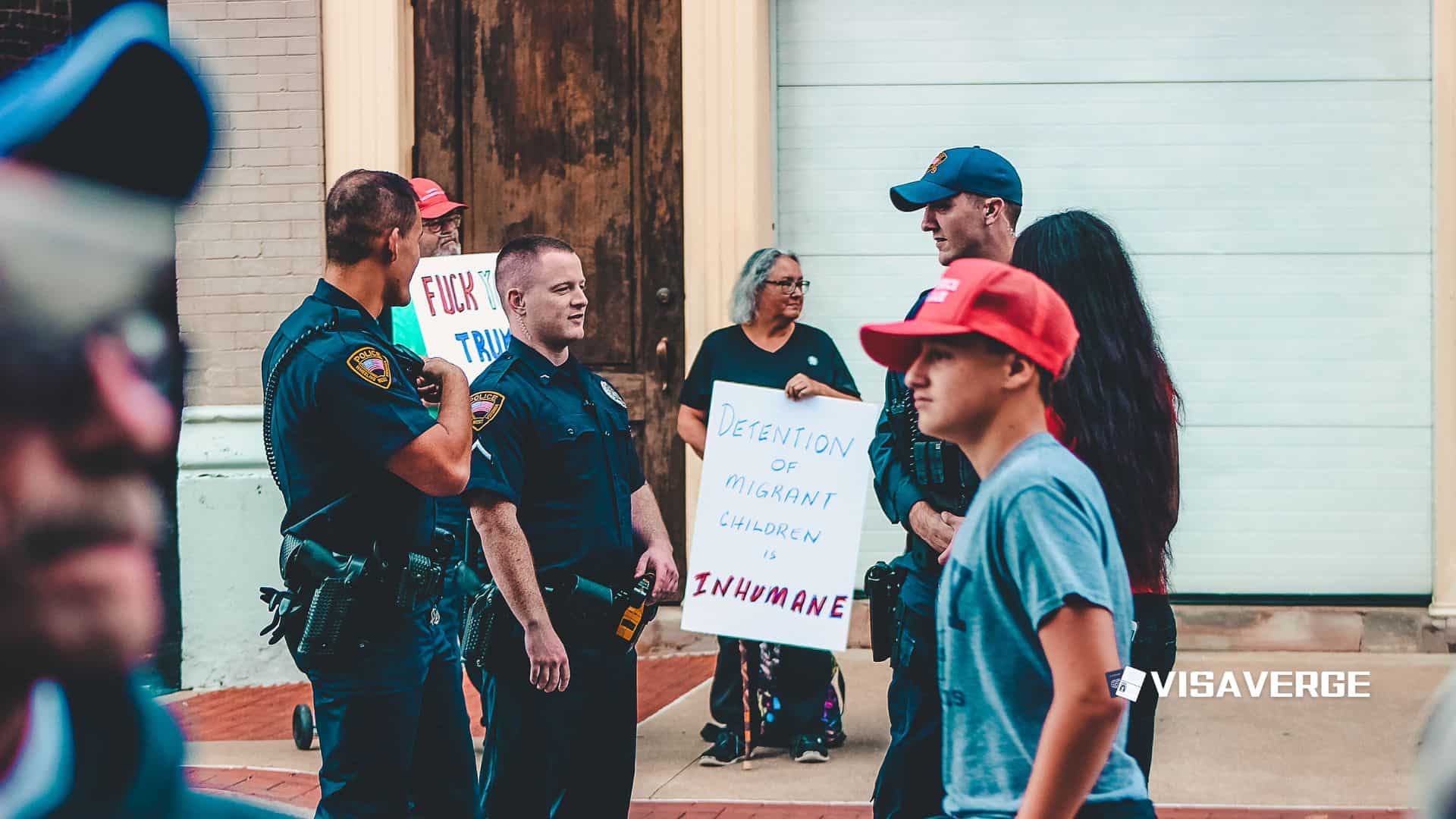Key Takeaways
• Since May 19, 2025, ICE arrested dozens outside Phoenix Immigration Court using expedited removal.
• Most arrested are asylum seekers attending hearings via the CBP One program legally.
• The operation dismisses cases then detains individuals immediately after court appearances.
Phoenix Faces Wave of ICE Arrests at Immigration Court: What’s Happening and What It Means
Phoenix is at the center of a major immigration enforcement operation that has left many residents feeling anxious and powerless. Over the past several days, Immigration and Customs Enforcement (ICE) agents have arrested dozens of people outside the Phoenix Immigration Court. These arrests are part of a larger nationwide effort under the Trump administration to speed up deportations, especially for people who have been following legal procedures and attending their court hearings. The situation has sparked protests, legal debates, and strong reactions from community members, lawyers, and public officials.

This article explains what’s happening in Phoenix, how the operation works, who is affected, and what it means for immigrants, their families, and the broader community.
Who, What, When, Where, and Why: The Lead
Since May 19, 2025, ICE agents have been arresting people outside the Phoenix Immigration Court. Most of those arrested are asylum seekers who came to court for scheduled hearings, often as part of the CBP One program—a process that lets migrants apply to enter the United States 🇺🇸 legally and seek asylum. After their court cases are suddenly dismissed by government lawyers, ICE agents—often in plain clothes and wearing masks—detain them as they leave the courthouse. This new tactic is part of a broader push by the Trump administration to increase deportations across the country.
How the Operation Works: Legal Steps and Process
The operation in Phoenix follows a specific pattern:
1. ICE prosecutors ask immigration judges to terminate certain court cases.
2. Once the judge dismisses the case, the person is no longer under the court’s protection.
3. ICE agents then arrest the individual outside the courthouse and place them in “expedited removal” proceedings.
Expedited removal is a fast-track deportation process that allows the government to deport people without a full court hearing. This process was created in 1996 and was mostly used for people caught near the border who had been in the United States 🇺🇸 for less than two years. Now, for the first time, ICE is using this process for people who have been living in the country and attending court as required.
David Bier, director of immigration studies at the Cato Institute, explained, “There’s a legal argument for ICE to rely on here but it’s untested, because no administration has ever applied the expedited removal statute away from the border.” In other words, this is new territory for immigration law.
What’s Happening at the Phoenix Immigration Court
On May 22, 2025, protestors gathered outside the Phoenix Immigration Court after ICE agents detained dozens of people following their hearings. Videos show plainclothes officers, some masked and armed, taking people away in handcuffs as they left the building. Similar arrests happened the day before, with at least three people detained on camera.
The pattern is clear: people attend their scheduled hearings, government lawyers move to dismiss their cases, and ICE agents arrest them as soon as they step outside. This has continued for several days, and more arrests are expected.
Who Is Being Targeted?
Most of those arrested are asylum seekers who entered the United States 🇺🇸 legally through the CBP One program. They have been following the rules, attending their court hearings, and waiting for a decision on their asylum claims. Many came to the United States 🇺🇸 fleeing violence or persecution in their home countries.
Immigration lawyers say their clients were shocked. Attorney Antonio Ramos in Miami said he started getting calls from family members of those arrested as early as May 19. Many families feel betrayed, as they believed attending court was the right thing to do.
Community Response: Fear, Anger, and Protest
The arrests have caused fear and anger in Phoenix. On May 22, protestors gathered outside the courthouse, holding signs and speaking out against the arrests. Local news described “a busy day outside an immigration courthouse in downtown Phoenix” with community members expressing heartbreak and frustration.
One protestor said, “My heart is broken for all the people who will miss him tonight… for his kids or for his family and also for him being tricked essentially into detention and not knowing what comes next.”
Official Reactions: State and Federal Responses
Arizona Governor Katie Hobbs responded to the ICE arrests, saying, “My office is in contact with DHS to gather more information. We need to prioritize efforts to deport criminals and secure the border. Indiscriminately rounding up people following the rules won’t make us safer.”
ICE has not released official numbers on how many people have been detained in Phoenix or nationwide in recent days. Some supporters of the operation argue that courthouses are safer places for arrests because of security measures like metal detectors, but critics say targeting people who are following the law is unfair and damaging.
National Context: Phoenix as Part of a Larger Operation
Phoenix is not alone. Similar ICE arrests at immigration courts have been reported in Los Angeles, Seattle, Chicago, Dallas, Las Vegas, and Miami. This is part of a nationwide push by the Trump administration to increase immigration arrests and carry out what the president has called “the largest deportation campaign in American history.”
ICE detention numbers have already risen sharply. As of February 23, 2025, ICE was holding 43,759 people in detention—the highest number since 2019. Of those, 52.1% (22,797 people) had no criminal record. ICE is now responsible for more than half of all arrests leading to detention, compared to 48% by Customs and Border Protection.
Legal Concerns: Due Process and Rights
Many legal experts are worried about how these arrests are happening. Dan Kowalski, a retired immigration attorney and editor-in-chief of Bender’s Immigration Bulletin, called the operation “a way to get around the normal Section 240 immigration court proceedings, and pick off the low hanging fruit of people who are trying to comply with the law, go to immigration court, and attend their hearings.”
Attorney Ferrer reported that ICE agents arresting his clients “did not provide identification, they did not have an arrest warrant, they did not make any attempt to establish whether or not they had committed a crime. They just went in and took them.”
The expedited removal process means people lose many of the protections they would have in a regular court hearing. David Bier explained, “It effectively removes the need for Immigration and Customs Enforcement to prove someone is removable to an immigration judge, and allows them to remove them on their own authority, based on their own determinations… it reduces the amount of due process entitled to the immigrant.”
People can appeal the termination of their case, but they must do so from detention, and many do not have a lawyer to help them.
Border Statistics: Fewer Crossings, More Arrests Inside the U.S.
These courthouse arrests are happening at a time when border crossings are at historic lows. In April 2025, Customs and Border Protection reported just 12,035 total encounters at the Southwest border—a 93% drop from April 2024, when there were 179,737 encounters. Border Patrol caught only 8,383 people between ports of entry in April, averaging just 279 per day—the lowest monthly total in 25 years.
With about 16,700 Border Patrol agents along the Southwest border, this means each agent is averaging only 0.5 apprehensions per month.
Similar Enforcement in Other Cities
Phoenix is not the only place seeing increased ICE activity. In Charlotte, North Carolina, community groups have reported a surge in ICE detentions outside homes, schools, churches, and during traffic stops. The Carolina Migrant Network said their hotline, which usually gets 2-4 calls a week, received over 133 calls since May 13, 2025. Advocates are worried about ICE using unmarked vehicles and plainclothes officers. In one case, a man was tackled in a pond near the Mecklenburg County Courthouse.
What Should Immigrants Do?
Despite the risks, immigration lawyers strongly advise people not to skip their court hearings. Missing a hearing can lead to an automatic deportation order from the judge. This puts immigrants in a tough spot: attend court and risk arrest, or miss court and risk being ordered deported anyway.
Legal experts recommend the following steps for those with pending immigration cases:
- Consult with an immigration attorney before attending any scheduled hearings.
- Know your rights if approached by ICE agents. You have the right to remain silent and to ask for a lawyer.
- Make sure family members know what to do if a loved one is detained. Have a plan and important phone numbers ready.
- Document any interactions with ICE or other law enforcement. Write down names, badge numbers, and details of what happened.
For more information about your rights and the immigration court process, visit the U.S. Department of Justice’s Executive Office for Immigration Review.
Community Support and Resources
Community organizations and legal advocacy groups in Phoenix and across the country are working to support affected families. They are providing legal advice, helping people understand their rights, and organizing protests to demand fair treatment.
Local officials are also monitoring the situation. Governor Hobbs and others have called for more transparency from ICE and for a focus on targeting criminals, not people who are following the law.
What Does This Mean for Phoenix and Beyond?
The current wave of ICE arrests at the Phoenix Immigration Court marks a major change in how immigration laws are enforced. By targeting people who are attending court as required, the operation has created fear and confusion in immigrant communities. Many feel betrayed by a system that tells them to follow the rules, only to arrest them when they do.
As reported by VisaVerge.com, these actions have raised serious questions about due process, fairness, and the future of immigration enforcement in the United States 🇺🇸. Legal experts warn that using expedited removal in this way could set a new precedent, making it easier for the government to deport people without giving them a fair chance to make their case.
Key Takeaways and Next Steps
- Phoenix has seen a wave of ICE arrests at the immigration court, targeting mostly asylum seekers who are following legal procedures.
- The operation uses a legal strategy where cases are dismissed, and people are then arrested and placed in expedited removal proceedings.
- Community members, lawyers, and officials have raised concerns about fairness, due process, and the impact on families.
- Similar operations are happening in other cities across the United States 🇺🇸.
- Immigrants are advised to attend their court hearings but to consult with attorneys and know their rights.
- Community organizations are providing support and resources to those affected.
The situation in Phoenix is still developing, with more arrests expected. It’s important for anyone affected to stay informed, seek legal help, and connect with local support groups. For official information about immigration court procedures and your rights, visit the U.S. Department of Justice’s EOIR website.
By staying aware and prepared, individuals and families can better protect themselves during this challenging time. The actions in Phoenix highlight the need for clear, fair, and humane immigration policies that respect the rights of all people living in the United States 🇺🇸.
Learn Today
ICE → U.S. agency enforcing immigration laws and conducting arrests and deportations nationwide.
Expedited Removal → A fast-track deportation process allowing removal without full court hearings.
CBP One Program → A government initiative enabling legal asylum application and processing inside the U.S.
Immigration Court → A federal court handling cases of immigration status and deportation proceedings.
Due Process → Legal requirement ensuring fair treatment and rights before deprivation of liberty.
This Article in a Nutshell
Phoenix faces unprecedented ICE arrests at its immigration court, targeting law-abiding asylum seekers. This new expedited removal tactic disrupts established legal protections, sparking protests and deep community concern over fairness and immigrants’ rights nationwide.
— By VisaVerge.com













